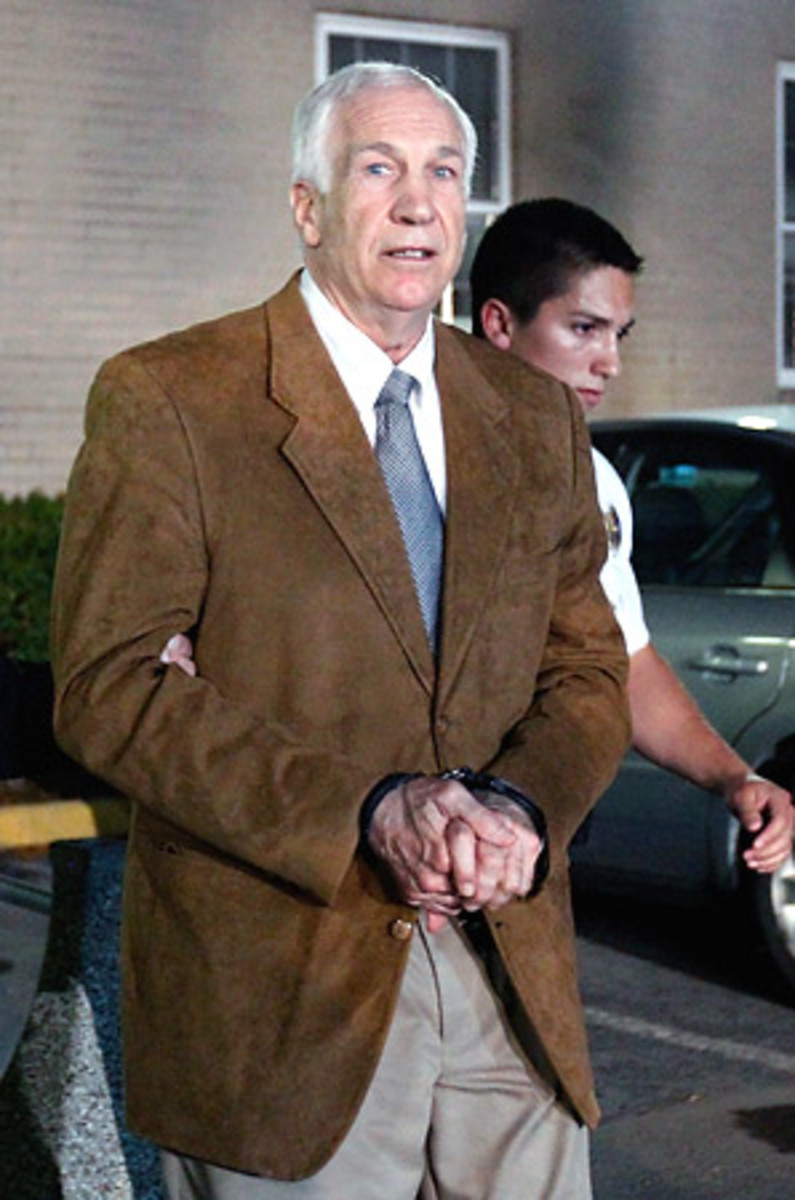Sandusky case should be watershed moment in our society
Officially, a jury of Jerry Sandusky's peers needed 21 hours to find him guilty of child sex abuse. But really, it took at least 15 years. So many eyes were closed. So many ears were covered. So many people believed in a man because they wanted to believe in him.
Sandusky will spend the rest of his days in jail, most likely in a continuing state of delusion and mental illness. (Isn't everybody who is guilty of child sex abuse truly guilty by reason of insanity?) But his case can, and should, be a watershed moment in American society.
We just have to remember Jerry Sandusky. Not the child molester. The hero.
That was how western Pennsylvania viewed Sandusky for decades. Don't let that get lost. He was a bright coach, an inspiring leader, an engaging speaker, and a supporter of children. He was not a creepy-looking guy in a trench-coat, peeking through the fence by the elementary-school baseball field.
People believed in Jerry Sandusky because he gave them good reasons to believe in him, and they believed even when they started to see evidence he was sick and destructive.
Until the trial, this was mostly a Penn State story, and understandably so. Institutionally, the school was guilty of gross negligence. Mike McQueary saw Sandusky raping a child in the shower of the Penn State football facility. The allegation soon evaporated. We will probably argue for years about who to blame for that: McQueary, Joe Paterno, athletic director Tim Curley, vice president Gary Schultz, president Graham Spanier, or (my opinion) some combination. But this was clearly a terrible failure. Sandusky enjoyed the perks of an emeritus coach even as the allegations piled up and the investigation unfolded. It is chilling.
That story is still important. But the trial told a separate story, too -- of so many smaller moments when somebody could have done a little bit more.
Victim 1's wrestling coach said he saw Sandusky and the victim "laying together side to side" in a seemingly inappropriate position in the wrestling room. "They were both startled that I came in," the coach said, but he evidently didn't think he'd seen enough to do anything.
McQueary testified that he witnessed Sandusky raping a boy -- Victim 2, who has still not been identified -- in a shower in the Penn State locker room. That may be the single most indefensible part of Penn State's actions. Nobody even tried to contact the kid's parents.
In a heartfelt piece in The Washington Post, former Penn State linebacker LaVar Arrington wrote that he remembered Victim 4 as a child.
"I knew he looked up to me and was a big fan, and I made a point of stopping to talk with him," Arrington wrote. "I'd ask him the usual questions: 'How are you?' 'How's school?' He always seemed mad or kind of distant. I remember distinctly asking him: "Why are you always walking around all mad, like a tough guy?'"
Arrington's regret is real and his candor is admirable. But surely, dozens of people knew Victim 4 better than Arrington did. They must have seen many more signs than Arrington.
Victim 6 told his mother about an attack, and she told authorities, and this led to Sandusky's infamous comment: "I wish I could ask for forgiveness ... I wish I were dead." A janitor supposedly saw Sandusky shower with Victim 8.
Victim 9 told his mother that Sandusky was "touchy-feely." He sometimes said he didn't want to visit Sandusky, and his mother testified that "I'd just make him go anyways." His underwear kept disappearing; he said he had accidents and threw them out, and his mother didn't really buy that, but she convinced herself it must be true.
America is fascinated by prominent criminal trials, from Mike Tyson to O.J. Simpson to Scott Peterson to Casey Anthony. At our lowest moments, we view them as entertainment. Sometimes we use them to feel superior to somebody.
We can all sit here and loudly proclaim that we would have done more than McQueary, more than Paterno, or more than Schultz, Spanier and Curley. I hope that is true. But most of us probably won't ever be in McQueary's position.
We may, however, be in the same spot as these other folks, hearing a snippet here and a detail there, just enough to make us wonder. I hope when that happens, we do more than just wonder. I hope we ask questions and keep asking them. There was so much gruesome testimony and public talk about the body parts of an aging man and young boys in this trial. But it all could have been stopped years ago by one good set of vocal cords.






